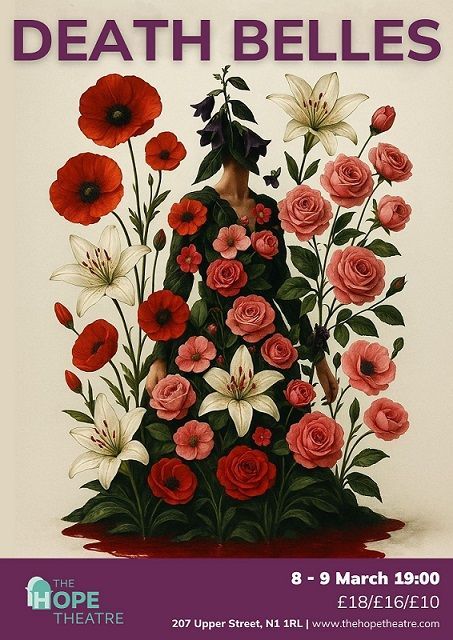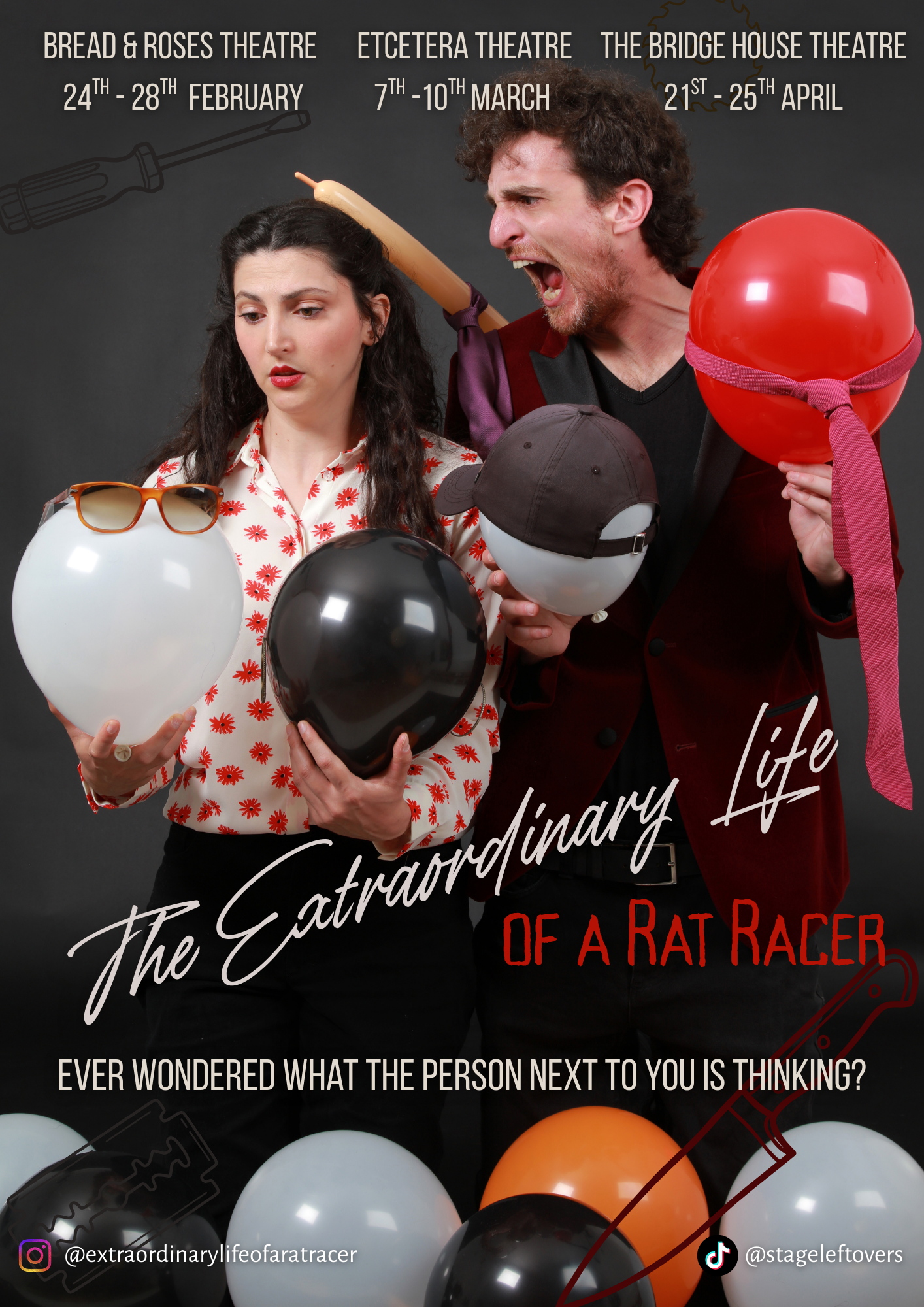Review: Reboot Festival at Barons Court Theatre 19 - 23 September 2023
The third week of Baron’s Court Theatre’s Reboot Festival hosts everything from period drama to government by Tinder in a thought-provoking evening of 7 short plays.
Drawing Under The Microscope
The first show to open the night gives a solid introduction for what’s in store. The story focuses on the real life study of fungi by Beatrix Potter, better known to us now as the author of the Peter Rabbit series of books but in this play a young woman with a committed interest in this burgeoning science of her day, which her former governess and friend does her best to support.
The period setting is well-served by thought out props and costumes, and both actors use the space well. It’s an enjoyable experience seeing an under-represented part of history come to life, but there is something of a lack of tension in the plot itself to really draw one in.
The crux of the story is that Potter herself can’t present her research due to the sexist standards of her Victorian peers, and rather than flesh out this difficulty the issue is easily resolved by Potter’s governess simply telling her to believe in herself, which she promptly does. A clean ending, but not a memorable one.
Nil By Sea
Of the bunch, this play has the most notable ambitions, stumbling in places with its narrative but providing the most eye-catching visuals among its peers.
The story itself focuses on the death of an illegal migrant on a residential street, having fallen to his death from a plane on which he was a stowing away thousands of feet above. Contrasting him are three women who live on the street who discuss the incident and what possible meaning it has, the narrative cutting back and forth between them and the migrant himself, monologuing as he makes his fatal journey.
It’s in these monologues that the stark lighting comes into play, striking sharp angles and colors throughout, most notably in the moment of death of the man himself. Opposite this however are the bland scenes featuring the female characters, who are evenly lit as they fail to come into their own as characters, often feeling homogeneous and their eventual conflict/resolution artificial and unengaging. The length of the piece bares mentioning as well, being by far the longest of the night, crowding out the others and failing to justify its length.
Two Girls
This short piece had the most unique delivery of the night, with both actors embracing the unique space of Baron’s Court as they floated around its edges, each telling a separate but shared story of women subjected to criminal acts in modern life.
Details here will be sparse because the play itself was short but effective, both actors keeping in time with one another and jumping on top of each other’s lines in a way that kept the pace engaging and the storytelling arresting. It was over in what felt like minutes, did what it set out to do, and did it well. Hopefully with this outing under its belt this can develop into a longer piece of equally high quality.
The Chronicles
In a brave twist, this piece divides the life of one modern Ukrainian woman fleeing the ongoing war in her home country between two actors – the first portraying her body and the second her mind.
Each character narrates sections of the woman’s life from their perspective, speaking in the third person to further emphasise the dissociation that our heroine has suffered due to the trauma of her experiences.
It’s an effective and touching dynamic, and the play would be much the better for sticking to it, as unfortunately the narrative strays into many disparate directions of the character’s life and both actresses go beyond the bounds initially established by their characters, muddying the waters as to what exactly they are portraying. There’s great potential here, but it needs more refinement,
Like Clockwork
The highlight of the week is to be found here. An excellent story performed with passion and conviction that left the audience asking exactly the questions we should.
Featuring two people seemingly in love midway through a birthday celebration, the tone shifts gradually to reveal a haunted atmosphere, in which the lines between life and death blur while pain and grief burst to the surface.
With subtle lighting changes, the story achieves a quietly otherworldly atmosphere to match the creeping dread of its narrative, the most delightful part of all being the fact that the scenario itself is never fully explained; the story simply comes to us, intrigues us, succeeds in gaining our sympathy, then ends. Intelligent scene-setting and pacing with terrific performance – everyone involved is a talent you owe it to yourself to watch out for.
The Lock
Two sisters talk nervously before one hands the other a pregnancy test. She leaves to take it, the remaining sister glancing nervously at both their phones, before the other returns. The test is positive. The only question left – do they tell him?
All the tension implied in the above is present in this play, but alongside it is a skillfully drawn warmth and humour that establishes both the bond between the sisters as well as their own individual character traits. A particular highlight is when the impregnator himself, Ryan, is about to arrive and the test must be hurriedly hidden, hilariously in a box of Cheez-Its
But the specter of Ryan hangs heavy over everything here, and although the build up to the climax is tense and fun, the arrival of Ryan himself is a damp squib. The script seems to call for him to be charming yet menacing, but these qualities simply did not materialize on the night, which deprived the ending of the punch it needed. The sisters remain great characters despite this, providing a solid foundation for any future iterations with this work.
Will Of The People
Rounding out the night is a tale of...well it’s hard to say really.
Taking on topics as far ranging as democracy, sexual assault, capital punishment, political double-crossing and more, this was a piece that stupefied in its wide breadth of themes. The action focuses on a departing Prime Minister having a final talk with his deputy – a simple enough start that soon devolves into a dystopian future where government is powered by votes submitted through ‘swipes’ on an app. It’s a vote using this technology that’s resulted in the dethroning of the PM in light of accusations about his personal character, which leaves one thinking the piece will develop into a biting satire.
Not so. The story turns on the fact that the PM is in fact to be executed rather than turfed out, that his family were also therefore set to be executed the day before, except they were switched and replaced by others because this is England after all and the powerful will never suffer real punishment, but then actually the family weren’t switched, and his deputy perhaps set this all up, and presumably there’s a point somewhere here – to say it lacks focus is an understatement. Poorly grounded personal drama quickly pushes aside any satirical value the piece could have, and despite the actor’s best efforts little can save this piece from needing significant re-drafting.
Reboot Festival at Barons Court Theatre (Week 3) 18 – 23 September
Creatives for Week 3:
Drawing under the Microscope by Janine Sobeck Knighton, directed by Leo Bacica
Nil by Sea by Katie Pollock, directed by Estrella Mabika
Two Girls by Allie Costa, directed by Beth Graham
The Chronicles by Anna Halas, directed by Josh Hinds
Like Clockwork by Andrada Anglieri, directed by David Frias-Roblas
The Lock by Katherine Swan, directed by Sharon Willems
The Will of the People by Andrew Allen, directed by Amalia Kontesi
Reviewed by Harry Conway









